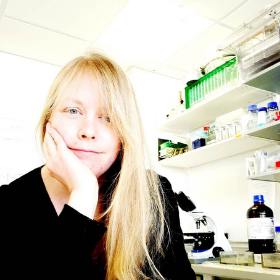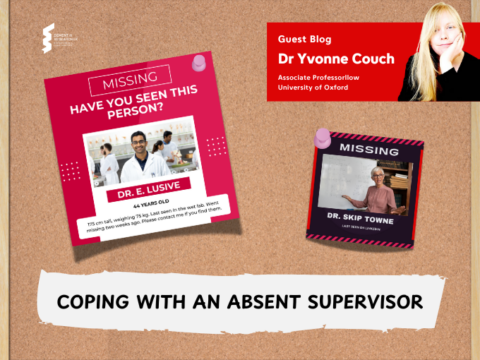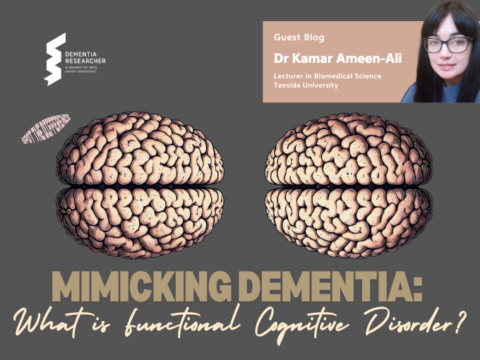
Dr Yvonne Couch
Name:
Dr Yvonne Couch
Job title:
ARUK Research Fellow
Place of work / study:
University of Oxford
Area of Research:
Stroke, vascular dementia and extracellular vesicles
How is your work funded?
Gates Cambridge Scholarship / Alzheimer’s Research UK
Tell us about your career path to becoming an early career researcher.
I did my undergrad in Neuroscience at Manchester, where I did a year in industry working at Boehringer Ingelheim in Germany on a project about inflammation. When I returned for my final year I combined this interest with my original degree in neuroscience by working with Stuart Allan on a project in neuroinflammation. From there I worked as a research assistant in Oxford on a project about Parkinson’s but wrote a PhD proposal which sadly didn’t get funded but did provide the basis for my masters project which I started in 2008. I did a masters and then a PhD in the Department of Pharmacology at Oxford, studying the role of systemic inflammation on behaviour and the serotonergic system. From there I went on to a post-doc at the University of Southern Denmark, working with Kate Lambertsen on stroke. After a year I returned to Oxford to work with Alastair Buchan, developing my own interests alongside working on some of his projects. I was on rolling contracts for around 4-5 years before I finally managed to get a fellowship with Alzheimer’s Research UK which I was awarded last February but which I delayed because of COVID.
What does your research focus on?
My interest is in extracellular vesicles and their role in communicating brain injury, both to other parts of the brain and to the rest of the body. Stroke causes an increase in the number of extracellular vesicles in the circulation and we’ve found that these are pro-inflammatory. My current working hypothesis is that these vesicles are involved in modifying the function of the vasculature after a stroke, potentially leading to the development of vascular dementia.
Do you have any advice for someone looking to embark on a career in dementia research?
Find a great mentor and a project you love and you can’t go wrong.
What are the best bits about being an ECR?
I am in charge of my own work and how I spend my time and where my research goes. So if I have a really long day, or have to work both days at the weekend, I can choose to take it slightly easier a couple of days during the week. I love the interactive aspect of science, chatting through ideas and plans with other researchers is one of my favourite things to do.
What do you see as the main challenges?
Lack of support from Universities. ECRs are often encouraged to have many strings to their bows; research, teaching, outreach, public engagement, conference organization, supervision, and sometimes there simply aren’t enough hours in the day and the lack of job stability within Universities makes this extremely challenging.
What do you write about?
I write about everything from the scientific aspects of working in stroke and vascular dementia, to funding, to mental health, to techniques. I hope to mix it up each month so that there’s a bit of variety for people to read and listen to.
Tell us a fun fact about yourself:
I have a 5 year old adopted black Labrador called Ovie who sleeps more than any other creature I have ever met.
Why did you choose to work in dementia?
The prevalence of dementia after stroke is three times higher than the average and we still don’t understand why. I find this kind of knowledge gap fascinating, the potential for new discoveries is huge and the potential to have a meaningful impact on the field is wonderful. I love problem solving, it’s one of the reasons I got into science, and so when we have major health problems like this which can potentially be solved by making small steps in advancing our knowledge I get to really enjoy my work.

 Print This Post
Print This Post









Hi Dr Couch,
It was wonderfully refreshing to find your blog about the blood-brain barrier and inflammation.
To say that dementia research is a bit brain focused is an understatement and in my view, that focus is the reason for the gross lack of scientific progress and knowledge that is desperately needed to help those suffering from dementia-related brain diseases.
Having researched the bigger picture and also the deeper issues… around the why of dementia brain diseases… I understand very well why the brain remains the target of dementia research funding allocations.
Systemic inflammation is definitely a key player in the development of neurodegeneration and research shows that when you change the environment of the brain, via the system – because everything is connected – then brain inflammation and amyloid plague build up returns to normal and cognition improves.
I believe that the accumulation of amyloid plaques is a symptom rather than a cause of brain disease because a) research shows that reducing it by medical means does not improve cognitive issues b) I know that the trigger of inflammation and abnormal protein build up around neurons lies outside of the brain. c) The protein build-up is more likely simply a protective mechanism that is very connected to inflammation.
The real triggers of systemic and brain inflammation are not being addressed, and until they are, brain disease continues to progress.
The blood-brain barrier weakens as we get older for various reasons, which again are not being addressed. We have this belief that when we get old we get diseased because this is what we see around us and we all have ageing brains that are shrinking and this is ‘normal’ because it’s happening to everyone? It is not normal, it only appears to be the case.
What might happen if we take steps to strengthen the blood-brain barrier naturally over time? We should expect the brains environment to slowly return to a healthful state and for cognitive function to improve. Evidence shows that the brain is a regenerative organ and very little is being done to take advantage of this fact.